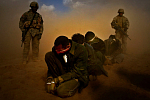 Documentarians are kicking arse
Documentarians are kicking arseAlex Gibney talks Gonzo, Taxi and the state of the art
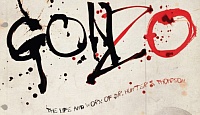
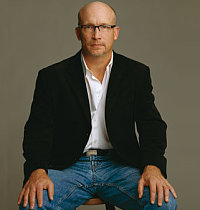
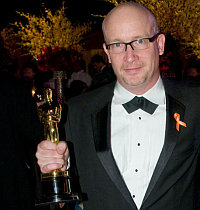
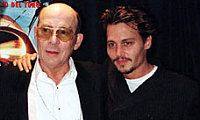
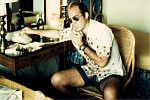
GONZO: THE LIFE AND WORK OF DR HUNTER S THOMPSON (2008)
 After winning the Oscar in February for Taxi to the Dark Side, Alex Gibney shifted gears rather drastically to look into the life and work of the original gonzo journalist, Dr Hunter S Thompson. And yet the film carries the same political kick as both Taxi and his previous film about Enron. I caught up with him in London and asked him how he got involved with Hunter Thompson...
After winning the Oscar in February for Taxi to the Dark Side, Alex Gibney shifted gears rather drastically to look into the life and work of the original gonzo journalist, Dr Hunter S Thompson. And yet the film carries the same political kick as both Taxi and his previous film about Enron. I caught up with him in London and asked him how he got involved with Hunter Thompson...Alex: Graydon Carter, the editor of Vanity Fair, came up to me after Hunter Thompson committed suicide. Graydon had edited some of his work for Vanity Fair, so thought it would be interesting to do this now. I thought, "Yeah, it would be." I had been a fan when I was younger, but I wasn't a Hunter completist. And I didn't know him. So in a peculiar way I was very insecure about that, in particular because my first day on the job was going out to the funeral.
Rich: So how did you approach it?
My plan was that, since all of these people would be at the funeral, I was going to interview them all. So we set up a camera in a hotel with the idea that we would start moving people through. But no one f****ing wanted to talk to me! We did shoot the funeral though.
Why didn't they want to talk?
I can understand why - I mean, who the f*** am I? After I got over that initial disaster I kind of got into the idea that I could get to know by talking to people who knew him.
Were there people who helped more than others?
I think his first wife Sondi did. Her perspective had to be coloured by a certain amount of anger, but she helped me a lot in terms of understanding him. His son Juan was interesting and in her own way his second wife Anita - the people who were very close to him. And sometimes I got stuff that may not be what they intended to tell me but sort of told me through indirection. Those three were very powerful. And Tim Crouse was interesting because he travelled with Hunter as a kind of junior reporter, and Hunter was very fatherly toward him. He saw a kind side and also just laughed at how wicked his humour could be.
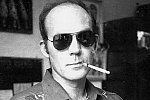
Hunter’s great gift was his humour - he was like Mark Twain. And it’s a vicious gift because there’s a social critique there
For commercial reasons we thought early on we'd interview the actors who hung around with Hunter - Johnny, Bill Murray, Sean Penn, John Cusack - but at the end of the day, we focussed on an earlier era when they didn't know him. Then we decided that the film would be narrated and that Hunter would tell his own story - that was a breakthrough from the narrative perspective - so the idea is that it's the undependable narrator at the heart of the story, and its Hunter. I didn't want somebody just to read it; I wanted somebody to read it as if it were Hunter reading his own work - and that's Johnny. He could inhabit Hunter and he could be Hunter.
Enron and Taxi to the Dark Side are overtly political, but even when you're looking at Hunter's work from the 60s there's this sense that he's speaking to current political issues.
Well I think Hunter is relevant, and I think that's why it made sense to make this film now. I'm talking now about doing a fictional miniseries about this book Den of Thieves, which is all about the first round of financial buccaneers, people like Mike Milken and Ivan Boesky, because now you can dig into that story in the past and see stuff in the present which you couldn't see before because it hadn't been revealed to us yet. So I think for that reason, there's something about the American character that Hunter spots, and you realise how relevant it is to what's going on today: a sense of conflict between light and dark. There was a great book I read called Sentimental Imperialists, about American foreign policy - what better description of our attitude - and the idea that we keep thinking that by dint of our military might we can go out into the world and remake it in our image. In a power sense it sort of works, but there's always unintended consequences. You can't go out and remake Iraq and expect it to be like Ohio! And nor could we do it in Vietnam or Guatemala. So that remains - this weird contradictory quality to the American character. Hunter was great at that because not only could he write about, he lived it.
Is there anybody filling that role now?
I can't think of anybody who's really like that. There are people who have bits and pieces of Hunter. In his own way, Christopher Hitchens plays the bad boy of the literary set, and is a hard drinker, and recently inserting himself more and more into his journalism. In terms of using their righteous anger in a wickedly funny way, it's the TV guys like Stephen Colbert and Jon Stewart that have captured a little bit of Hunter. Because Hunter's great gift was his humour - he was like Mark Twain. And it's a vicious gift because there's a social critique there, but it's the humour that gets to us. We all laugh together.
How do journalism and documentary filmmaking relate to American politics today?
Well, I think that politicians today have become such bold-faced liars, and the way they portray themselves is so choreographed and so ritualised, that its hard to get at it. You really have to find funny ways to get at it. But they say the most outrageous things - they say it in Enron and Taxi to the Dark Side - and that's why I think documentary filmmakers have certain advantages over people from the New York Times, because I have ways of setting it in a different type of context that's more anarchic. And that's a valuable thing.

The documentary as a form has come into its own because people threw out the rulebook
Well those are the subversive ones, and I think he's good at getting to people. I don't know how nobody knows that Ali G or Borat is coming to talk to them - how does that work that they don't know? Are they living in their mattress? But I think that subversive stuff is great because it exposes exactly the truth. And that day when Jon Stewart went on Crossfire and he looked at the guys on the right and the left and he said, "Stop it! What you're doing is awful!" - it was great to see the proscenium fall away. The great problem in America is distraction - the entertainment culture - and every once in a while people get shown the real s***. Like when Katrina happened, people were angry, and suddenly the spin zone wasn't working anymore. And that was the first time you saw journalists actually getting angry at the politicians. But how much does it f***ing take?
Journalists basically gave George W Bush six years to say whatever he wanted.
"We do not torture!" "Yeah, sure, I guess you're right."
What do you think about the state of documentaries today?
All the inventive stuff is very exciting, like Man on Wire and Waltz With Bashir. The documentary as a form has come into its own because people threw out the rulebook. I didn't like the politics in The Fog of War, but I thought that as a formal piece of art it's fantastic - witty and rich and some things that could have been so stupid - like visualising the domino theory with dominoes! - but actually in some fundamental way you see how stupid the formulation was, not the filmmaker. This was brilliant stuff. So the documentarians I think are kicking arse! Documentaries are very often more interesting than the fiction films, because even the indie fiction films have a sort of formulaic quality.
So what's next - it sounds like you have a lot of things in the works.
I probably have too many.
Well, not many documentary filmmakers get two films out within a year, since it takes so long to shoot and edit.
Tell me about it! Well I was actually supposed to have three. Casino Jack and the United States of Money, about lobbying and political corruption, is done basically, but we're waiting for one element that I think will just take it to another level. And if I get that, we'll promptly conclude. And then we got the rights to the film that Ken Kesey and the Merry Pranksters took on the trip across the country.
Gus Van Sant is making the fictional film.
Yes, he's making The Electric Kool-Aid Acid Test. I was just up in Portland visiting with Gus, and he has the first draft of the script. But I'm doing a documentary.
A nice companion piece to Gonzo.
Yes, it will be. And I think we're going to kind of push the immersive quality little further. We may do a few on-camera interviews, but I think the attempt will be to put you right in the bus if possible because that's what makes it exciting. It's not as interesting in this case to have the Pranksters look back at what they did and contextualise it for themselves, but it is interesting to see them on the bus inventing the 60s. Because 64 isn't really the 60s; it still has a foot in the 50s. But like Gonzo it's getting our hands around the material that takes the time. And I'm also doing something about Eliot Spitzer, and that has some intersection with the current financial meltdown because he was the sheriff of Wall Street. But then we also go from the world of economics to the world of high-priced hookers! So that's an interesting story.
It sounds like you definitely have way too many things in the works.
I do. I really need to stop. I want to go on vacation!
TRAFALGAR HOTEL, LONDON, 29.Oct.08
HOME | REVIEWS | AWARDS | NEWS | FESTIVAL | Q&A | ABOUT | TALKBACK
